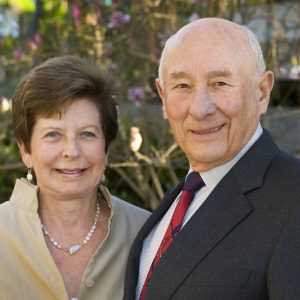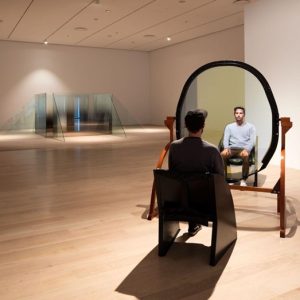 View Winners →
View Winners → Groundbreaking television producer Norman Lear dies at 101
Norman Lear, one of the original inductees into the TV Hall of Fame and the force behind groundbreaking sitcoms including “All in the Family,” “Maude,” “Good Times” and “The Jeffersons,” has died at his home in Los Angeles, his family announced Wednesday. He was 101.
According to a statement from his family, Lear died Tuesday at his home “surrounded by his family as we told stories and sang songs until the very end.”
“Norman lived a life in awe of the world around him,” according to the family. “He marveled at his cup of coffee every morning, the shape of the tree outside his window and the sounds of beautiful music. But it was people — those he just met and those he knew for decades — who kept his mind and heart forever young.
“As we celebrate his legacy and reflect on the next chapter of life without him, we would like to thank everyone for all the love and support.”
Lear, whose shows broke ground by highlighting often divisive social issues such as racism and divorce, was a six-time Emmy award winner and worked on programs including “Sanford & Son,” “One Day at a Time” and “Mary Hartman, Mary Hartman.”
Lear was born in 1922 in New Haven, Connecticut, and went to high school in Hartford before attending Emerson College in Boston. However, he dropped out in 1942 to join the United States Army Air Forces, the predecessor to the U.S. Air Force, and flew 52 combat missions over Europe during World War II with the 15th Air Force out of Foggia, Italy.
After returning from the war, Lear began his television writing career in 1950 when he and his partner Ed Simmons were signed to write for “The Ford Star Revue,” starring Jack Haley. They were later hired away by Jerry Lewis to write for him and Dean Martin on “The Colgate Comedy Hour.”
In 1959, Lear created his first television series starring Henry Fonda, a half-hour western called “The Deputy,” which ran for two seasons from 1959 to 1961 on NBC.
In addition to television, Lear produced several feature films. He was nominated for an Academy Award in 1967 for a feature screenplay, “Divorce American Style.”
When Lear heard about a groundbreaking television show in England, “Till Death Us Do Part,” about a combative household, he tried to sell a concept about a blue-collar American family to ABC. The network rejected the show after two pilots were shot. Lear eventually got the greenlight from CBS for “All in the Family,” which premiered on Jan. 12, 1971, and gave America Lear’s most famous creation, Archie Bunker, the bigoted family patriarch played by Carroll O’Connor.
Each episode opened with O’Connor and Jean Stapleton, as their characters Archie and Edith Bunker, sitting side-by-side at a piano and singing the show’s theme song, “Those Were the Days.” Fiery exchanges between Bunker and his liberal son-in-law Michael Stivic, played by Rob Reiner, explored the most controversial issues of the day and was groundbreaking for openly talking about racism, women’s rights and the Vietnam War.
At first, the ratings were disappointing, but the show took home several Emmy Awards that year, including Outstanding Comedy Series. “All in the Family” performed better during summer reruns and thrived in the 1971-1972 season, becoming the top-rated show on TV for the next five years. “All in the Family” ran for nine seasons, earning four Emmy Awards for Best Comedy series, as well as the Peabody Award in 1977, becoming a television landmark.
“I loved Norman Lear with all my heart,” Reiner wrote on social media Wednesday. “He was my second father. Sending my love to Lyn and the whole Lear family.”
Lear’s second big TV hit was also based on a British sitcom, “Steptoe and Son,” about a west London junk dealer and his son. Lear changed the setting to Watts and sold the show to NBC, calling it “Sanford & Son.” The show became the highest-rated half-hour series in NBC history at the time. “Sanford & Son” starred Redd Foxx and Demond Wilson as a father and son team running a family junk-dealing business. The sitcom aired from 1972 to 1977.
Lear had a succession of other television hits — “Maude,” “Good Times,” “The Jeffersons” — all spinoffs from the “All in the Family” world.
“Maude,” which aired on CBS from 1972 to 1978, featured a strong female lead character, Edith Bunker’s feminist cousin Maude Findlay, who was played by Bea Arthur. Maude was opinionated like Archie Bunker, but her politics were completely different, as she was a liberal progressive.
“Maude” also featured a housekeeper, Florida Evans (played by Ester Rolle), who left in 1974 to her own spin-off, “Good Times,” which portrayed a Black family in a Chicago high-rise tenement apartment. Street crime, unemployment, evictions and racial bigotry were frequent topics on the show. “Good Times” also made Jimmie Walker one of the biggest sitcom stars at the time by playing the breakout character J.J., who had his own catchphrase, “Dy-no-mite!”
In 1973, Lear cast Sherman Hemsley in the role of George Jefferson, Archie Bunker’s Black neighbor in “All in the Family.” The character was such a hit that Hemsley was soon cast in the spin-off series “The Jeffersons,” which aired on CBS from 1975 to 1985.
It was one of the first shows to portray an upper middle class Black family, as the Jeffersons lived in a penthouse apartment in Manhattan, or as the show’s theme song said, “a deluxe apartment in the sky.”
On the sitcom, George Jefferson was loud-mouthed and hot-headed and had no problem sharing his cynicism about white people. “The Jeffersons” was also one of the first shows to feature an interracial married couple who were the Jeffersons’ neighbors, Helen Willis and her white husband Tom, played by Roxie Roker and Franklin Cover.
Other hit shows soon followed, including “One Day at a Time” and “Mary Hartman, Mary Hartman.” At one point, Lear had seven series on the air and more than 120 million viewers each week.
In his 2014 memoir, “Even This I Get To Experience,” Lear reflected on creating characters such as Archie Bunker, George Jefferson and Maude Findlay.
“They were all entertaining marvels,” wrote Lear. “Larger than life, they were all repositories of that need to be seen and heard and understood, even as they showcased themselves, and dealt with in others, the foolishness of the human condition.”
As Lear entered his 90s, he kept busy, taking on the role of executive producer of a new version of his show “One Day at a Time,” which ran on Netflix and featured a Cuban American working mother.
Lear also recently worked with late night host Jimmy Kimmel on his Emmy-winning specials, which were all-star recreations of Lear’s classic sitcom scripts. “Live in Front of a Studio Audience” aired live on ABC starting in 2019.
Throughout his life, Lear received numerous honors and awards. He was among the first seven television pioneers inducted into the Television Academy Hall of Fame in 1984. In 1999, President Clinton bestowed the National Medal of the Arts on Lear, declaring, “Norman Lear has held up a mirror to American society and changed the way we look at it.”
Lear was a 2017 Kennedy Center Honoree. In 2021, the Hollywood Foreign Press Association awarded him the Carol Burnett Award for Achievement in Television. He won six Primetime Emmys and a Golden Globe.
In addition to creating television shows, Lear was an activist, founding the First Amendment advocacy group People for the American Way in 1981. He launched Declare Yourself, a nonpartisan youth voter initiative that registered over 4 million new, young voters in the 2004, 2006 and 2008 elections.
One of the few surviving original copies of the Declaration of Independence was purchased in 2001 by Lear and his wife Lyn Davis Lear. The couple shared it with the American people by touring it to all 50 states through their Declaration of Independence Road Trip.
When Lear turned 100, his family posted a video on social media of the producer reflecting on his life and appreciating the present moment.
“The moment between past and present, present and past, the moment between after and next … treasure it, use it with love,” said Lear.
Lear is survived by his wife Lyn, and he was the father of six children and four grandchildren.









































































































